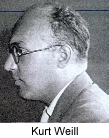|
||||
|
Home
| Kurt
Weill | Drew's books on Kurt Weill |
Drew's Weill
Editions: 1. Concert and Radio Works | |
||||
|
NB - Performance rights and Rentals: the term 'etc' following 'UK' in the definitions of territories corresponds to BREV in the current edition of Kurt Weill - A Guide To His Works (Kurt Weill Foundation) where it is defined as "Countries of the former British Commonwealth [sic], including Australia, New Zealand, Israel, etc. [sic]. 1. CONCERT AND RADIO WORKS Since its publication by Universal Edition - in vocal score in 1967, in study score in 19.. - the edition has been widely performed; and there have been several commercial recordings. In recent years, however, Weill scholars in Germany and elsewhere have been increasingly critical of the edition - not without reason, but not always with sufficient understanding of the original circumstances and rationale. Recognising a need to reconsider the edition from today's standpoint, and to test public and critical reactions, the editor proposed to experiment with two alternatives during the year of the Weill Centenary. The first experiment was during the BBC's Weill Weekend (January 2000), the second at the Aldeburgh Festival in June. The latter - repeated a few weeks later at the BBC Proms under the same conductor (Thomas Adès) - was conclusive in all respects but one. As of April 2002, the version with men's chorus has yet to be performed with Weill's own a cappella version of 'Zu Potsdam unter den Eichen'. Voices and instrumentation:
Version B (suitable for radio or
recording conditions) The order of numbers is the same as in Version A, but Weill's a cappella arrangement of Zu Potsdam unter den Eichen is replaced by Walter Goehr's 1960 orchestration from the vocal score of the original setting for three solo voices and ensemble - Weill's own orchestration being lost. Both Versions: Voices and instrumentation:
Duration: 21 minutes Published Editions: vocal score Universal Edition 9789; study score Universal Edition 16630 Performance Rights and Rentals: USA, UK 'etc': European American Music Corporation, All other territories: Universal Edition Publisher: Universal Edition Recordings: As of November 2002, there are several commercial CDs of the 1967 edition, but no plans to record versions A or B. References: Drew's essay in the programme-book of the Aldeburgh Festival 2000 considers the Requiem as a torso, and explains the background to the tentative versions performed in the year of the Weill centenary. Suite 'In the Old Style' (for large string
orchestra, with five wind and brass, and unison male chorus)
(1922) 1. Concertino - 2. Aria - 3. Scherzo - 4. Chorale-Fantasia Movements 3 and 4 are all that remains of Weill's six-movement Divertimento op.5, whose first and only performance was given by the Berlin Philharmonic Orchestra under Heinz Unger in April 1923. (The same forces had already performed the Chorale-Fantasia at a concert of music by members of Busoni's masterclass in December 1922.) The Divertimento remained unpublished, and the unique manuscript score was one of the early holographs lost after Weill left Germany in 1933. However, a pencil short-score of the Scherzo, together with a complete set of parts for the Chorale-Fantasia, were among the papers in Weill's Hudson Valley home which David Drew began cataloguing in 1958. In 1971 the European Broadcasting Union responded favourably to Drew's suggestion that the addition of two further unpublished movements from the Weill legacy, dating from approximately the same period, would provide a suitable context for the Scherzo and Finale. Duly commissioned by the EBU, a four-movement suite arranged by Drew and Christopher Shaw was first performed by the Südwestfunk Orchestra under Ernest Bour at an all-Weill concert in the Hans-Rosbaud Hall in Baden-Baden on 10 January 1972. The title adopted on that occasion was 'Divertimento'. Despite its perpetuation in catalogues and licensing agreements for three decades, the title has obvious disadvantages, and apart from usurping the rightful position of the original op.5 should the score ever come to light, it gives a false impression of the musical character (Mozart's great Divertimento K.563 notwithstanding). With the agreement of the Kurt Weill Foundation and the publishers, the title of the Drew/Shaw arrangement is now changed as above. As in the original Divertimento, the scoring of each movement is different, and there is a contrast between tutti and chamber music textures. Framed by an introduction and coda for the full ensemble, the first movement, Concertino, is scored for tutti strings with solo string quartet, like a concerto grosso; the second movement, Aria, is for string quartet only (though a tutti arrangement would be feasible); the Scherzo is for Weill's designated septet of soloists (clarinet, horn, bassoon, and string quartet); and the Chorale-Fantasia is for the full string orchestra, supplemented by trombones, with solo horn doubling unison men's chorus in the Chorale (whose text is a Lutheran prayer). Instrumentation: clarinet, bassoon, horn, 2 trombones, solo string quartet, full strings Duration: ca. 22 minutes Performance materials: European American Music Corporation Recording: Largo CD 5130 (Testimonies of War, 1914-1945, Poznan Philharmonic, c Andrzej Borejko - Chorale Fantasia only) Symphony No.1 (in one movement):
study score, Schott-Mainz, 1968 Both editions continue to serve their practical purposes, but will in due course be superseded by KWE texts. The First Symphony had never been performed during the composer's lifetime, and presents many technical and notational problems. Its successor was rehearsed and performed in his presence on at least two occasions, but not edited for publication in his lifetime. The Schott edition postdates the 1966 copyright line by at least a year. |
||||
|
||||
|
Material Copyright © 2002 David Drew. |
||||
